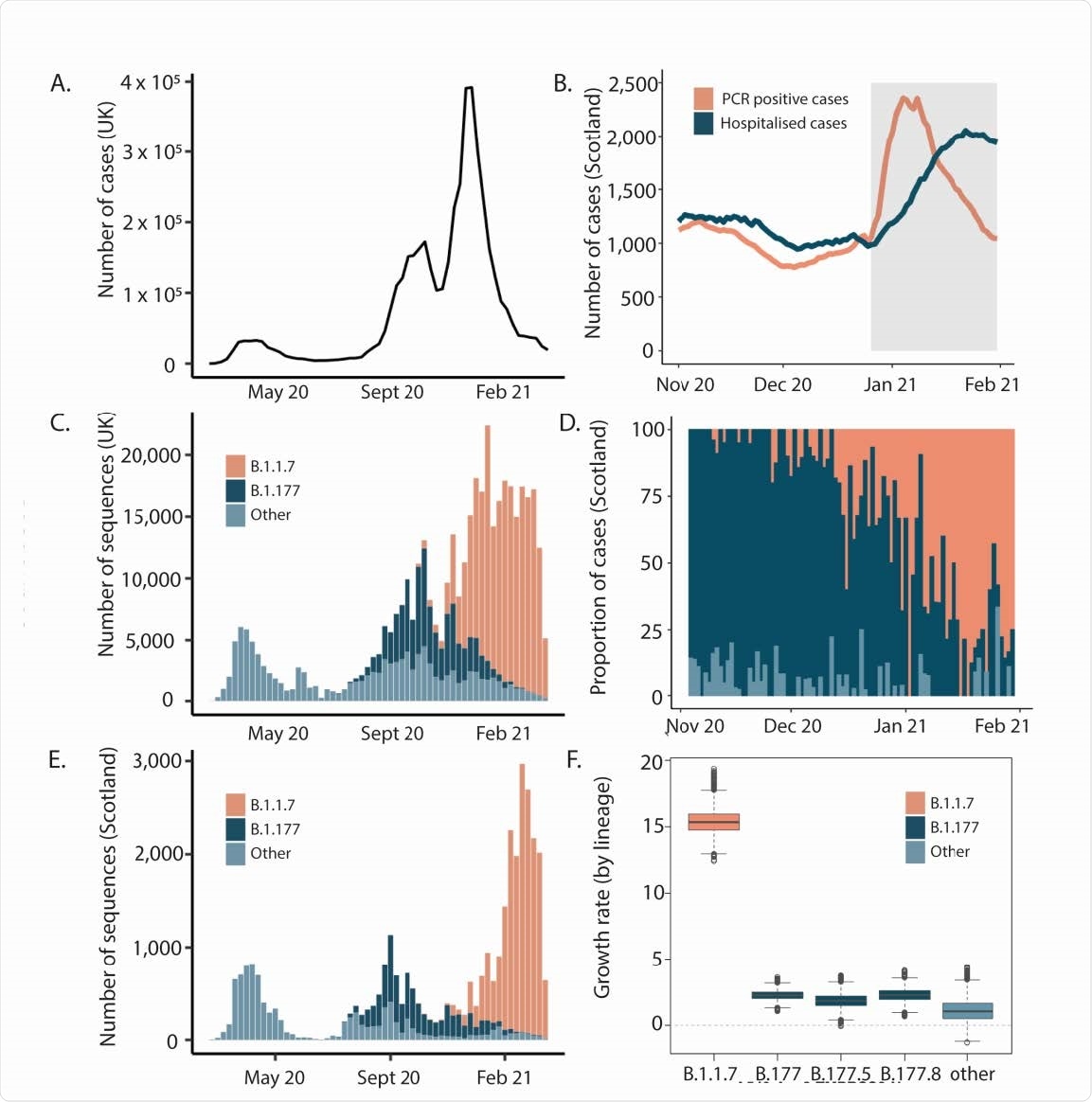A team of UK-based scientists has recently revealed that the alpha variant (B.1.1.7) of severe acute respiratory syndrome coronavirus 2 (SARS-CoV-2) is responsible for the third pandemic wave in Scotland and that the variant is associated with more severe coronavirus disease 2019 (COVID-19). The study is currently available on the medRxiv* preprint server.

Background
The alpha variant of SARS-CoV-2 was first identified in the UK in September 2020. The variant is characterized by 21 genomic mutations, including 8 mutations in the spike glycoprotein. These mutations are responsible for the significantly high binding affinity of the alpha spike for the host cell receptor angiotensin-converting enzyme 2 (ACE2).
Recently, studies have reported that infection by alpha variant increases the risk of hospitalization and 28-day mortality. However, there is contradicting evidence claiming that the variant does not impact the clinical severity of COVID-19.
In the current study, scientists have investigated alpha variant transmission dynamics and clinical characteristics in Scotland, UK.
Study design
The scientists analyzed the genomic sequences of SARS-CoV-2 obtained from a total of 1,475 patients. In addition, they conducted amplicon-based next-generation sequencing to identify causative variants. Overall, the study cohort included both hospitalized and community patients.
To determine the correlation between alpha infection and disease severity, they used a cumulative generalized linear mixed model that includes a 4-point scale of maximum severity based on the need for respiratory support at 28 days. Furthermore, they estimated the transmission rate of the alpha variant in Scotland using a phylogenetic exponential growth rate population model.

Important observations
The study findings revealed that the alpha variant of SARS-CoV-2 is responsible for Scotland's third wave of COVID-19 pandemic. The variant exhibited 5-fold higher transmissibility than the co-circulating B.1.177 variant responsible for the second pandemic wave.
The findings of the whole genome sequencing analysis revealed that of 1.475 enrolled patients, 364 were infected with the alpha variant, 1.030 with B.1.177, and 81 with other co-circulating variants.
Clinical severity of COVID-19
The study revealed a positive association between alpha infection and disease severity. Compared to infections caused by other co-circulating variants, infections with the alpha variant were clinically more severe. Specifically, patients infected with alpha variant exhibited higher viral loads compared to other patients. Moreover, a moderate increase in the risk of requiring supplemental oxygen was observed following infection with alpha variant.
A relatively smaller impact of alpha variant on disease severity was observed in a separate set of analyses conducted specifically on hospitalized patients. As mentioned by the scientists, it could be because of the smaller sample size.
In contrast to previous evidence, no association was observed between alpha infection and 28-day mortality. Similarly, no evidence linking alpha infection with longer hospital stay was found in the study.
Study significance
Collectively, the study findings reveal that the SARS-CoV-2 alpha variant has 5-fold higher transmissibility than other co-circulating variants, justifying its rapid spread in Scotland. Moreover, patients infected with this variant may experience more severe clinical consequences, including the requirement of supplemental oxygen.
Based on these findings, the scientists suggest that in countries with low vaccine coverage where alpha variant is still not dominant, further improvement in healthcare facilities is urgently required to meet the medical requirements of possible alpha outbreaks.
*Important Notice
medRxiv publishes preliminary scientific reports that are not peer-reviewed and, therefore, should not be regarded as conclusive, guide clinical practice/health-related behavior, or treated as established information.
- Pascall DJ. 2021. The SARS-CoV-2 Alpha variant is associated with increased clinical severity of disease, medRxiv, https://doi.org/10.1101/2021.08.17.21260128, https://www.medrxiv.org/content/10.1101/2021.08.17.21260128v1
Posted in: Child Health News | Men's Health News | Medical Research News | Women's Health News | Disease/Infection News
Tags: ACE2, Angiotensin, Angiotensin-Converting Enzyme 2, binding affinity, Cell, Coronavirus, Coronavirus Disease COVID-19, Enzyme, Genome, Genomic, Glycoprotein, Healthcare, Hospital, Mortality, Oxygen, Pandemic, Receptor, Respiratory, SARS, SARS-CoV-2, Severe Acute Respiratory, Severe Acute Respiratory Syndrome, Syndrome, Vaccine, Whole Genome Sequencing

Written by
Dr. Sanchari Sinha Dutta
Dr. Sanchari Sinha Dutta is a science communicator who believes in spreading the power of science in every corner of the world. She has a Bachelor of Science (B.Sc.) degree and a Master's of Science (M.Sc.) in biology and human physiology. Following her Master's degree, Sanchari went on to study a Ph.D. in human physiology. She has authored more than 10 original research articles, all of which have been published in world renowned international journals.
Source: Read Full Article